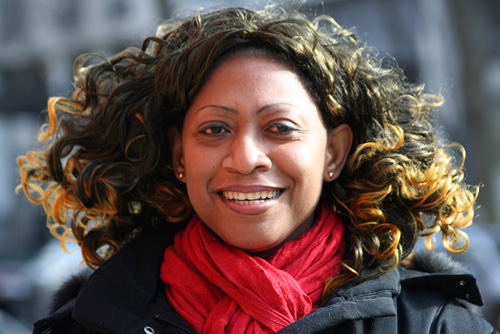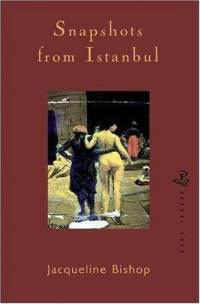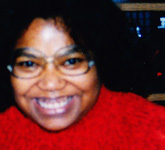
 Jamaican-born American poet Jacqueline Bishop
is the author of poetry collections Snapshots From Istanbul and Fauna, the novel
The River's Song, and the non-fiction Writers Who Paint/Painters Who Write: Three
Jamaican Artists and My Mother Who Is Me: Life Stories from Jamaican Women in New York.
She's also the founding editor of Calabash: A Journal of Caribbean Arts & Letters.
During an e-mail interview she and Arlene McKanic discussed, among other things, Calabash, Paris,
Ovid, Jamaica, and the Fulbright scholarship that allowed her to spend some time in Paris.
Jamaican-born American poet Jacqueline Bishop
is the author of poetry collections Snapshots From Istanbul and Fauna, the novel
The River's Song, and the non-fiction Writers Who Paint/Painters Who Write: Three
Jamaican Artists and My Mother Who Is Me: Life Stories from Jamaican Women in New York.
She's also the founding editor of Calabash: A Journal of Caribbean Arts & Letters.
During an e-mail interview she and Arlene McKanic discussed, among other things, Calabash, Paris,
Ovid, Jamaica, and the Fulbright scholarship that allowed her to spend some time in Paris.
AM: When did you found Calabash?
JB: I founded Calabash: A Journal of Caribbean Arts & Letters in 1999 when I was a graduate student in NYU's Creative Writing Program.
AM: What were your goals when you founded the magazine?
JB: Calabash sought to publish works encompassing but not limited to the four language groups of the region: the English-speaking, French-speaking, Spanish-speaking and Dutch-speaking Caribbean as well as their various Diasporas. We were looking also to presenting the arts and letters of those communities that have long been under-represented in the creative discourse of the region, namely Aruba and the Netherlands-Antilles, Asian and Amerindian communities, and Maroon societies. Calabash had a strong visual arts component.
AM: Is one of the magazine/anthology's goals to open up opportunities for women writers of Jamaican origin?
JB: I was seeking to open up opportunities for Caribbean writers. That of course included opening up opportunities for women writers. I would not say that the magazine's goal was specifically to open up opportunities for women writers of Jamaican origin, as I would say we were seeking to open up opportunities for women writers of Caribbean origin.
AM: What sort of work are you looking for for Calabash?
JB: We are currently not looking for work for Calabash. I have not published the journal in several years. Money troubles. As well as the fact that for the last couple of years I have been travelling, taking up two consecutive Fulbright fellowships. I find it hard though to say that we won't publish the journal again, because I am so attached to it; and did so much work to make it live. It feels like my child. But currently we are not looking for any work.
AM: You were born and raised in Kingston, Jamaica? What was that like?
JB: It has definitely had a strong impact on me! Of course there are all the things that show up in my writing, the sense of community, of identity, of being part of a rich cultural legacy. I am very thankful for that. But I was born in the 1970's and lived through the brutal 1980's election as a child. The daily death announcements on the radio, the fear, especially for my mother, who was at that time directly involved in the political life of the island, that experience was harrowing. The violence of that time and the violence that has continued, I think informs part of the reason why I am not living on the island today.
AM: When did you come to New York? And why?
JB: I came to New York in 1980's largely to be reunited with my mother.
AM: Where were you when you found out you'd won the UNESCO/Fulbright Fellowship?
JB: I was back in New York, teaching at NYU for the summer, when I found out officially that I had won the fellowship.
AM: Why'd you choose Paris (now, that might seem obvious, but Istanbul sounds like a pretty nice place too!) Been to Paris before? What have you seen/where have you been that's amazing?
JB: Paris is where the UNESCO fellowship placement was; to accept the fellowship I would have to come to Paris. So I had no choice at all in the matter, and I agree that Istanbul is quite lovely too.
Yes, I have lived in Paris before, one year as an undergraduate, so in a sense I am coming back to Paris.
AM: And why were you in Istanbul? It says in the Acknowledgment [of Snapshots from Istanbul] that Adam McConnel asked you to come. Could you tell that story?
 JB: The story goes like this, at the time I had a friend who is a well known journalist, and
I was searching for a place to go for a while because I just needed a break from New York; a
city that I love, New York, the place really that is my home, but from time to time I need
to get away. My journalist friend has a well known blog and he wrote in the blog that I was
looking for somewhere to go and, believe it or not, Adam McConnel, an American who neither
of us knew at the time responded to the blog and told me to come on over and stay with him
and his Turkish wife. Just like that. Even more amazing to me now is that I actually went!
I would end up going several more times to Istanbul and needless to say Adam McConnel, who
still lives in Istanbul, has become family.
JB: The story goes like this, at the time I had a friend who is a well known journalist, and
I was searching for a place to go for a while because I just needed a break from New York; a
city that I love, New York, the place really that is my home, but from time to time I need
to get away. My journalist friend has a well known blog and he wrote in the blog that I was
looking for somewhere to go and, believe it or not, Adam McConnel, an American who neither
of us knew at the time responded to the blog and told me to come on over and stay with him
and his Turkish wife. Just like that. Even more amazing to me now is that I actually went!
I would end up going several more times to Istanbul and needless to say Adam McConnel, who
still lives in Istanbul, has become family.
Bishop's latest work, Snapshots From Istanbul, a slender and breathtaking book of
poetry, was inspired by a trip to Turkey. The poems deal with not only her journeys there,
which included a love affair with a man who, as a Kurd, couldn't possibly marry her, but also
with her childhood, her family, the ancient poet Ovid's banishment from Athens and the
self-exile of the painter Gauguin. Her language in each poem is lush, gorgeous, precise;
they are verses you want to even physically linger in somehow. Bishop's Istanbul poems
make one want to pick up and fly away to the city.
There are, of course veiled women here,
but not as many as I thought,
and they are not the only ones
The place is bigger than I thought,
packed more tightly than I thought,
much bigger I think, than Manhattan.
Mornings I wake to the call to prayer,
women shaking out dust-cloths from windows,
busying for the day
Taksim Square is just like the Village
in New York; same stores, same music,
people, like ants, always about....
(from Snapshots from Istanbul)
Her poems about Ovid, which lament his exile and his betrayal by people he thought were
his friends, could maybe have been written by the Roman poet himself. The succinct lines
in this poem remind one of verses found on bits of papyrus:
Oh I repent!
I repent!
Emperor,
I long to come home.
It is cold here —
the wine turns to ice;
when I talk:
an awful gray-blue smoke.
I am out among the barbarians.
I can hear them, even now,
drawing closer and closer.
(from Ovid in Exile)
AM: Ovid seems to be a guiding spirit for the book—as well as other artists like Gauguin. Why Ovid/the others?
JB: The attraction to Ovid is that he was banished for his home and was always longing for return. He was banished to live on an island among people who he felt were so different from him (I think they were called the Barbarians), and he longed and longed to be home among his own people. His story really appealed to me and I felt that I could identify with his story and translate it into poetry, the feelings of an exile longing to return home. But after a while as I was writing this body of poems I started to wonder, what if, instead of returning to a place where he was banished from, his home; instead, he tried to make peace with the place in which he was now living, and try to make that place his new home? I tried to explore those ideas as well in the poems. In a sense the collection tries to understand the various stages that Ovid might have gone through as an exile.
AM: What inspires you?
JB: Life does. It really inspires me those times when it does not leave me in absolute despair. I am training myself to not make the atrocities of the world greater than the beauties of the world. And I am training myself to enjoy the small things of the world. So when I look at my sisters for example, they really inspire me. Imagine for example the baby in the family, Kamara Soyini, who I used to carry around in my arms. Mademoiselle Kamara Soyini is not a baby anymore, but rather is getting ready to graduate from Union College and is forging a way for herself as a talented and accomplished actor. The space between the child who was in my arms and the one that is now a commanding presence on stage is incredibly inspiring.
Not to be corny about it, but that you could contact my publisher about interviewing me and that you could find value in my work inspires me as well.
I was with folks I love enormously in Morocco, and they were taking me out to buy blankets to keep me warm in France and taking me to the airport and fussing over me and I was fussing with one of them in particular and then on the plane back to Paris I was smiling and thinking to myself, goodness, two years ago I did not know these people and now they are so much a part of my life that I cannot imagine my life without them! To me, that is totally inspiring.
Finally, I think the natural environment is a huge inspiration for me, even though we are
witnessing an unprecedented loss of so much of the natural world, of biodiversity, of
pollinators; of bees and butterflies and so many of the things that I took for granted
as a child growing up. I cannot look away and pretend that these things, this tremendous
loss, is not happening. Nevertheless I am still inspired by the natural world.

Arlene McKanic is a writer who lives in Jamaica, New York and Blair, South Carolina when she can! She loves to read, look out
the window on cloudy days, try and grow artichokes in the garden, and walk around in the woods if the South
Carolina bugs aren't too bad. And read some more.